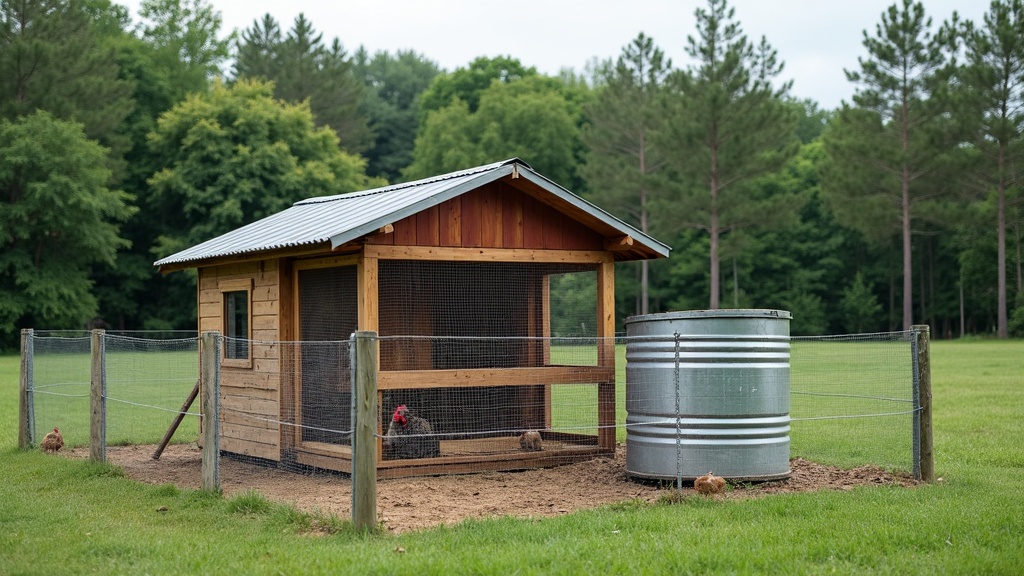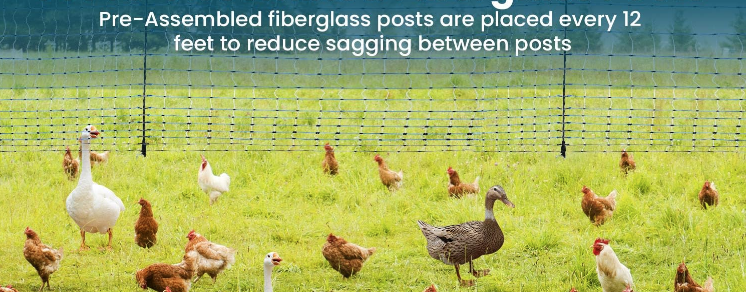 Raising backyard chickens in bear country definitely comes with its own set of challenges. Bears are smart, persistent, and incredibly strong. Basically, the last thing you want getting into your coop is a hungry bear. The trick to bear-proofing your chicken coop is working smarter, not harder, by using the right combination of tough materials, the best methods, and, in some cases, even some simple tech.
Raising backyard chickens in bear country definitely comes with its own set of challenges. Bears are smart, persistent, and incredibly strong. Basically, the last thing you want getting into your coop is a hungry bear. The trick to bear-proofing your chicken coop is working smarter, not harder, by using the right combination of tough materials, the best methods, and, in some cases, even some simple tech.
Bear proofing isn’t just about keeping your chickens safe; it’s also important for deterring bears from developing a habit of visiting human spaces. If a bear finds easy food at your place, it may keep coming back, and that never ends well for either your flock or the local wildlife.
This all-in-one guide will break down practical strategies, suggest top products, and lay out step-by-step tips that really help keep your chickens and local bears out of trouble. We’ll also throw in some hands-on advice for a stronger setup.
Why Bears Are Drawn to Chicken Coops
Bears have a sense of smell that puts most animals to shame. A chicken feeder, a couple of eggs, or even just the flock itself can catch a bear’s attention from a crazy long way off. If a bear snags something good from your coop, chances are it’ll be back for a second try, so it’s definitely smarter to prevent the first visit than deal with the aftermath.
Best Ways to Bear-Proof Your Chicken Coop
1. Pick a Smart Coop Location
- Put your coop somewhere you can keep an eye on; inside your line of sight from the house or close to spots where you spend time outdoors. Bears usually try to steer clear of people.
- Skip putting your coop too close to wooded areas, thick brush, fruit trees, or obvious animal trails. The more hidden the setup, the easier it is for a bear to sneak up unnoticed.
2. Put Up Serious Electric Fencing or Netting
- An electric fence is easily the most effective way to keep bears out. Plan on running five to seven wires, starting six inches above the ground and going up to four feet or so.
- Look for a charger that gives a real jolt; 6,000 volts or higher is a popular option. Even the boldest bear learns not to press its luck twice.
- Clear away grass or debris touching the fence every couple of weeks. Anything brushing against the wires can lower the zap, and you want that fence giving its full punch.
3. Reinforce Coop Walls, Roof, and Entry Points
- Forget regular chicken wire; a determined bear can rip right through. Use 16-gauge hardware cloth with half-inch squares for vents and windows.
- Build solid doors with thick wood or metal, and go with heavy-duty hinges. Avoid anything that can be pried loose or worked free.
- Add sturdy barrel bolts, twist locks, or carabiners to every entry. Bears can be scarily good at opening simple latches just by batting them around.
4. Secure All Chicken Feed and Waste
- Never keep feed inside the coop. Relocate it into a bearproof metal bin—something like a locking trash can—and keep it as far from the coop as possible.
- Collect eggs daily, so there’s one less reason for a bear to hang around.
- Don’t toss kitchen scraps or compost near your coop. Anything that smells increases your chances of attracting bears and other animals.
5. Make Use of Motion-Triggered Deterrents
- Motion-activated spotlights, sirens, or even sprinklers can spook bears for a while. They’re especially useful if you’ve noticed nighttime visits getting more common.
- Switch up your deterrents from time to time, so bears don’t get used to a single trick and learn to ignore it.
6. Improve the Coop’s Surroundings
- Clear out tall grass, berry bushes, brush, or woodpiles near your setup. The less hiding space, the more nervous bears feel coming close.
- Putting up an extra fence line a few feet away from your main coop is another popular move among chicken owners living in high-risk areas.
Extra Tips for Bear Proofing: What Really Matters
Solid Building Materials
Bears can tear apart a weak coop with barely any effort. Experience shows that wood panels under an inch thick just don’t hold up. Go with heavy, pressure-treated lumber or thick-gauge metal wherever possible.
Routine Maintenance
Bears, raccoons, and other critters can open any latch that isn’t properly locked, and over time, weak spots develop. Do a full once-over every week for loose panels, worn-out locks, or signs of chewing. Staying on top of repairs keeps you ahead.
Top Products for Heavy Duty Protection
- Bearproof feed bins: Stick to thick metal cans with twist or padlock closures, such as galvanized trash cans.
- Livestock-rated fence chargers: Brands like Parmak or Gallagher are reliable and easy to track down at farm supply stores or online.
- High-tension hardware cloth: This is pricier than basic chicken mesh, but the strength is worth it for peace of mind.
- Solar electric fence kits: Great for remote setups or people who prefer not to run an extension cord.
Seasonal Things to Watch For
- Spring: Bears wake up hungry after hibernation, making your coop look even more tempting.
- Fall: Bears get bold looking for extra calories before winter, so expect more attempts this time of year.
- All Year: Don’t leave feed, trash, or food scraps outside overnight. Bears can pick up the scent and make their way over any season.
Keeping People, Pets, and Bears Safe
- Watch over your chickens during free range time, especially early in the morning or later in the evening when wildlife is more active.
- Never let dogs chase or approach bears. If you spot a bear, bring pets inside and keep them leashed until it moves on.
- If you see a bear near your setup, make loud noises from a safe distance—using pots, car horns, or even just yelling can send it packing. Never go near or try to corner a bear.
Frequently Asked Questions About Bear Proofing Coops
Will regular fencing work against bears?
Regular garden or chicken wire will not stop a bear. Their weight, teeth, and claws make short work of it. You need hardware cloth and a solid electric fence for real security.
Is electric fencing safe for other animals?
With the right setup, electric fencing gives a strong but brief shock. It works to keep out predators without causing real harm to chickens or pets, provided they don’t keep touching it. Most birds and small animals catch on quickly.
Are there scents or repellents that work?
Some people try using things like ammonia or predator urine, but these rarely deter a determined bear for long. Physical barriers are a much safer bet.
How often should I check my setup?
Doing a weekly sweep is the smart move—especially after storms, high winds, or anytime something may have damaged your repairs.
More Tips to Make Your Bear Proofing Last
- Swap out any weak wood, wire, or rotten posts before the season starts.
- Check your electric fence every week or two, especially after bad weather or mowing nearby.
- Talk with neighbors or fellow chicken keepers about what works for them; you might stumble upon a trick or product you haven’t tried yet.
Keeping up with quick repairs and being creative with your setup can keep bears away, your chickens happy, and everything in your backyard running smoothly. Bear proofing might require some extra effort at the start, but spotting your flock safe and sound and not getting midnight wildlife surprises makes it all worthwhile.
© 2025 – 2026, Teresa. All rights reserved.


Having kept backyard chickens for years, I can definitely relate to the anxiety that comes with living near bear territory. Your point about bear-proofing being just as much about protecting wildlife as it is about keeping our chickens safe really struck a chord with me. I’ve seen firsthand how just one bear visit can trigger a series of troubling encounters.
I particularly loved your breakdown of coop materials and fencing; those specifics are so important. After learning the hard way that regular chicken wire is basically a welcome mat for determined predators, switching to hardware cloth was truly a game-changer for me.
Thanks again for such a thoughtful and practical guide. It’s posts like this that help us all raise our flocks with more confidence and care.
Thank you for sharing your experience! You’re so right—hardware cloth is a total game-changer compared to chicken wire, and it really does give so much more peace of mind. I also love your point about protecting both chickens and wildlife—that balance is so important.
Hi Teresa,
Such an interesting and informative article.
I didn’t know how much bears were drawn to chicken coops, and why you need to make them as bear proofed as you describe.
I will share this article with some friends who have chicken coops, as I’m not sure if theirs is bear proofed. I will encourage them to get in touch with you if they have any issues or questions, if that ids OK with you?
Keep up the great work.
All the best,
Tom
Hi Tom,
Thank you so much! I really appreciate you sharing the article — that means a lot. 😊 Bears can be surprisingly determined, so it’s always good to stay one step ahead. And absolutely, I’d be happy to help your friends if they have any questions!
All the best,
Teresa 🐓🐻